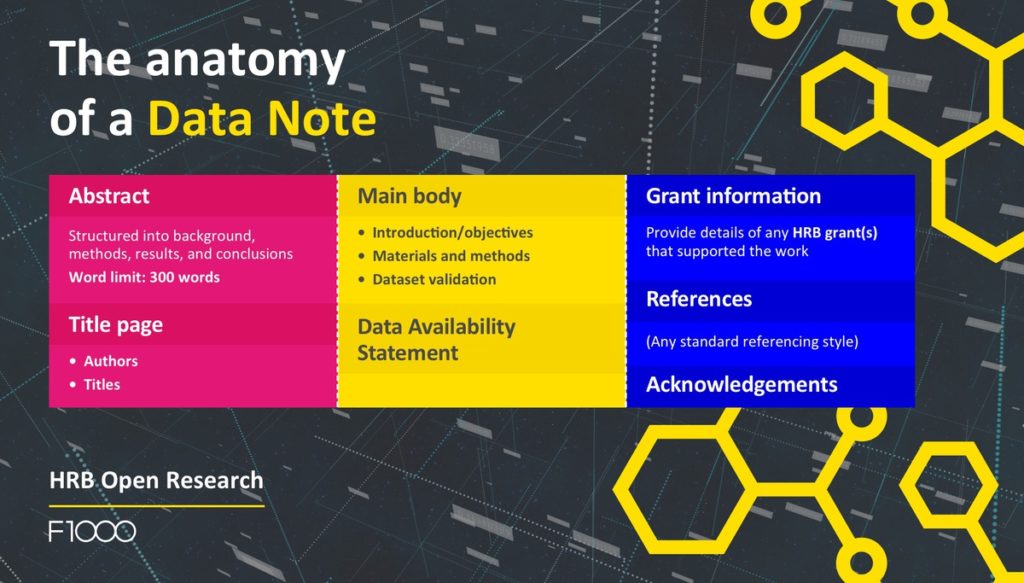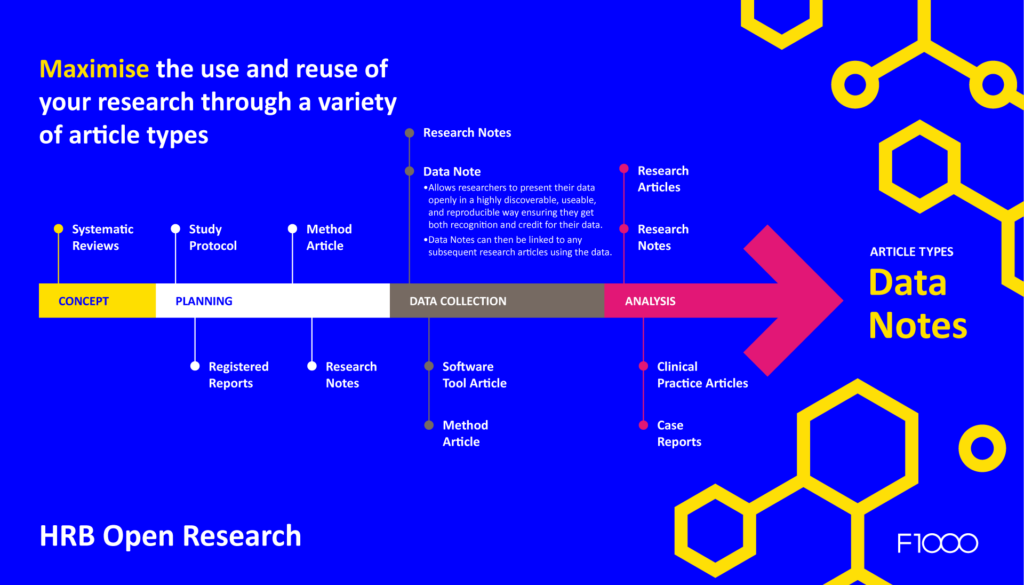Gain credit for your research data by publishing a Data Note on HRB Open Research
SUBMIT NOWPublishing Data Notes on HRB Open Research aims to increase visibility and transparency of research by supporting the sharing of data in a discoverable, useable and reproducible way, whilst helping authors to comply with the Platform’s Open Data Policy.
Data Notes do not include any analyses or conclusions; Data Notes published on HRB Open Research briefly and concisely allow researchers to describe their scientific data by including the following:
The rationale behind the data
A detailed account of the protocol used to generate the data
An explanation of any limitations
A Data Availability Statement detailing how and where to access the data
Reference to the dataset using a formal citation
Effective data sharing extends beyond simply depositing your dataset in a repository. Publishing a Data Note on HRB Open Research gives authors a citable publication with an assigned DOI. This helps to promote the discoverability and potential reuse of research data, whilst giving credit to data producers.
Data Note template
Download our handy template outlining all the essential information to cover in your Data Note for submission to HRB Open Research.

About HRB Open Research
HRB Open Research provides HRB-funded researchers with a place to rapidly publish a variety of traditional and non-traditional article types. All articles benefit from rapid publication, transparent peer review and editorial guidance on making all source data openly available.
HRB Open Research advocates for transparency and reproducibility in research, and our unique publishing model supports this at every stage. Articles can be published rapidly, with post-publication peer review creating an open dialogue between authors, expert reviewers and their research community. This generates feedback which can be used to improve the article and develop the author’s skills.
Upon passing peer review, all articles published on HRB Open Research will appear in Scopus, PubMed, DOAJ, and Google Scholar.
How can you benefit from publishing Data Notes on HRB Open Research?
Maximise the potential of your research data
Like all article types published on HRB Open Research, Data Notes are fully open access. This means your article is easily available to all stakeholders, including fellow researchers and policymakers. By sharing your datasets in a highly discoverable, useable and reproducible way, you can boost the potential reach and reuse of your data.
Receive credit for your research
As a fully peer reviewed and citable publication with an assigned DOI, publishing a Data Note provides you with additional opportunities to gain recognition and credit for your findings.
Get help with data management
At HRB Open Research, our expert, in-house Editorial team can help you with the deposition of your data by suggesting the most appropriate data repository. Download our Data Note FAQs to find out more.
Increase the discoverability of your research
Once your Data Note has passed peer review, inclusion in PubMed, Scopus and Google Scholar will help it reach more readers. Data Notes include validated links to the dataset in your chosen repository, and your article is supported by machine-readable metadata to support greater discoverability.
All types of data welcome
We understand that data can come in many forms, which is why a Data Note is suitable for all types of data. Whether it’s unpublished data from a Research Article, data that didn’t make it into a paper, or data you plan to use in a future article type, all is welcome at HRB Open Research. All we ask is that the research data must have been produced and is owned by the authors of the Data Note.
Open and FAIR data on HRB Open Research
HRB Open Research advocates an Open Data Policy. When you choose open data, this helps others to replicate your study and validate your results. As such, open data is a fundamental requirement for reproducibility and transparency, benefiting not just the individual researcher, but the research community, and wider society.
Open data is data that is available for everyone to access, use and share. For researchers, this refers to any information or materials that have been collected or created as part of your research project – such as survey results, gene sequences, software, code, neuro-images, even audio files. In research, open data practices are also known as ‘data sharing’.
The FAIR Guiding Principles provide a framework for research data management, designed to maximise its reuse and support open data practices. FAIR data is Findable, Accessible, Interoperable, and Reusable. FAIR data goes beyond open data, aiming to make the data itself more useful and user-friendly.
FAIR data guide

Learn how to make your data Findable, Accessible, Interoperable, and Reusable, with our guide for researchers.
Data Note FAQs

We answer the top five frequently asked questions by authors and researchers at the start of their Data Note journey in our handy FAQ guide.

Need help getting started with data sharing?

Repositories
Choosing the right repository for your research can be daunting. This handy guide asks you three simple questions to help determine the best repository for you.

Spreadsheets
Stuck on how to keep your spreadsheets interoperable and reusable? We’ve put together some dos and don’ts to ensure your spreadsheets follow best practice.

Licences
We’ve created a simple rundown of the different licences available for data and software to help you understand which licence is the right one for your research.
“HRB Open Research will help researchers to publish all findings quickly, easily and responsibly. This will increase transparency, reduce research waste and allow reproducibility of results. Ultimately HRB Open Research will help build more trust in the research process.”
Professor Declan Devane, Director of HRB-Trials Methodology Research Network, Professor of Midwifery, National University of Ireland Galway
Join our mailing list
Be the first to know about calls for papers, new content, researcher stories and more. Sign up to the HRB Open Research mailing list today.
